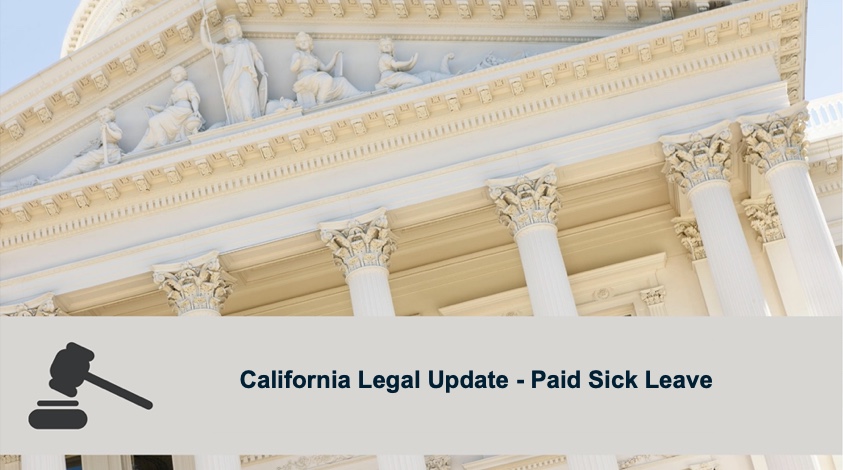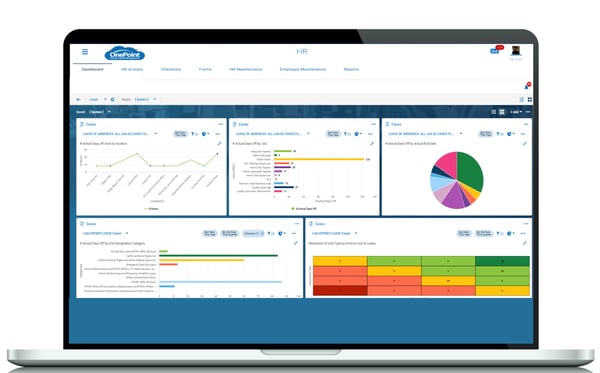California Enhances Family Leave and Sick Leave Protections

New leave protections signed into law in September 2020, ensure that millions more Californians can utilize Paid Family Leave benefits but add significant burdens to employers, especially small businesses.
“It’s truly unfortunate—and, quite astonishing—that anyone in the legislature would unnecessarily increase costs on California’s distressed employers and reduce employment opportunities for California workers,” said CalChamber President and CEO Allan Zaremberg. Here's whats new.
- Senate Bill 1383 expands the California Family Rights Act to make it an unlawful employment practice for employers with five or more employees to refuse to grant an employee’s request to take up to 12 workweeks of unpaid protected leave during any 12-month period to bond with the employee’s new child or care for themselves or a child, parent, grandparent, grandchild, sibling, spouse, or domestic partner, as specified. The leave may also be used to address a military exigency.
- Supplemental Paid Sick Leave for California Workers at Companies with 500 (Executive Order N-51-20). California has expanded its supplemental paid sick leave to cover many workers who are not entitled to emergency paid sick leave (EPSL) under the federal Families First Coronavirus Response Act (FFCRA). Previously, the state supplemental paid sick leave only applied to food-sector employers with 500 or more employees if they had to leave their home to work. Now, supplemental paid sick leave is available to employees of all employers with 500 or more employees nationwide. It also applies to healthcare providers and emergency responders of smaller employers (those with fewer than 500 employees) who can be denied use of federal EPSL at their employer’s discretion.
SB1383
The bill aligns the employer size threshold under the California Family Rights Act (CFRA) with the employer size threshold in Pregnancy Disability Leave, a program that has been in place since 1978.
Expands existing protections. Under earlier law, family and medical leave requirements extended only to the employee’s self, child, parent, or spouse. The employer coverage threshold was set at 50 or more employees. Among other things, Senate Bill 1383 expands the leave to include a grandparent, grandchild, sibling, spouse, or domestic partner. The bill also reduces the employer coverage threshold to five or more employees.
Under the law, which applies also to employees of state and local political subdivisions and cities, an employer that employs both parents of a child must grant leave to each employee. Under earlier law, the employer was only required in those circumstances to grant both employees a total of 12 workweeks of unpaid protected leave during the 12-month period.
Since California’s Paid Family Leave Program was enacted more than 15 years ago, lack of job protection under the CFRA has prevented millions of workers from accessing their Paid Family Leave Program benefits due to the size of their employer, according to the Governor’s Office in a September 17, 2020, news release, because of fear that if they did so, they could lose their jobs. Currently, 40 percent of California workers are at risk of losing their jobs if they take leave to care for a seriously ill loved one or themselves because their employer is too small. The new law will expand job-protected family leave and leave to care for one’s own illness to nearly 6 million more Californians.
Senate Bill 1383 will ensure that California workers affected by COVID-19 can take time to care for themselves or a sick family member and keep their workplaces and communities healthy and safe.
Military leave. Senate Bill 1383 also makes it an unlawful employment practice for employers to refuse to grant an employee’s request to take up to 12 workweeks of unpaid protected leave during any 12-month period due to a qualifying exigency related to the covered active duty or call to covered active duty of an employee’s spouse, domestic partner, child, or parent in the U.S. Armed Forces.
Qualified individuals. The expanded leave provisions apply to individuals with at least 1,250 hours of service with the employer during the previous 12-month period, unless otherwise provided.
CA Supplement Paid Sick Leave Order
Expanded Protections. Previously, the state supplemental paid sick leave only applied to food-sector employers with 500 or more employees if they had to leave their home to work. Now, supplemental paid sick leave is available to employees of all employers with 500 or more employees nationwide. It also applies to healthcare providers and emergency responders of smaller employers (those with fewer than 500 employees) who can be denied use of federal EPSL at their employer’s discretion. As a practical matter, employers who were previously denying federal EPSL to healthcare providers and emergency responders may want to change course because providing the optional federal leave will allow them to claim a tax credit whereas providing the mandatory leave only under state law will not. Employees who telecommute are not eligible for supplemental paid sick leave.
Qualified Individuals Covered employees are entitled to take up to 80 hours of supplemental paid sick leave. The amount is prorated for part-time employees. The leave must be paid at the employee’s regular rate of pay, up to $511 per day. Covered employees are entitled to use supplemental paid sick leave for the following reasons:
- The employee is subject to a federal, state, or local quarantine or isolation order related to COVID-19;
- The employee is advised by a healthcare provider to self-quarantine or self-isolate because of concerns related to COVID-19; or
- The employer prohibits the employee from working because of health concerns related to the potential transmission of COVID-19.
Notably — and unlike federal EPSL — the law does not provide time off for employees to care for others who are sick or quarantining or to care for children.
For food-sector employees, the law applies retroactively to April 16, 2020 (which is when the law originally took effect by executive order). For all other covered employees, the law took effect September 19, 2020. Supplemental paid sick leave will be available until federal EPSL expires; currently the federal program is slated to run through December 31, 2020.
Earlier in the year, the governor issued an executive order requiring employers to allow food-sector employees to wash their hands every 30 minutes or more often if needed. This requirement is now part of the California Retail Food Code.
Notice Requirements:
Employers must post the appropriate notice below in the workplace. If employees do not regularly go to the workplace, it should be distributed to them electronically.
Notice for Food Service Employers
Notice for Employers with 500+ Employees or Healthcare Providers or Emergency Responders
Manage paid sick leave compliance with configurable accrual rules
OnePoint HCM Leave Manager versatile rules engine simplifies your ability to accurately track sick leave accruals, rollovers and caps to meet local paid sick leave compliance laws.
Minimize compliance risk by configuring accrual calculations for multiple groups with varying accrual rules. Configure entitlements and the system tracks employee work data and accruals for easier eligibility determination. Give employees in different leave groups real-time visibility to see the amount of sick leave to meet local laws without creating extra work for HR.
Contact OnePoint for a demonstration of our Leave Management Solution.

Subscribe to updates
Get the latest posts delivered to your inbox.